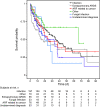Etiologies and Outcome of Patients with Solid Tumors Admitted to ICU with Acute Respiratory Failure: A Secondary Analysis of the EFRAIM Study
- PMID: 37072164
- PMCID: PMC10209001
- DOI: 10.4187/respcare.10604
Etiologies and Outcome of Patients with Solid Tumors Admitted to ICU with Acute Respiratory Failure: A Secondary Analysis of the EFRAIM Study
Abstract
Background: Acute respiratory failure (ARF) remains the most frequent reason for ICU admission in patients who are immunocompromised. This study reports etiologies and outcomes of ARF in subjects with solid tumors.
Methods: This study was a post hoc analysis of the EFRAIM study, a prospective multinational cohort study that included 1611 subjects who were immunocompromised and with ARF admitted to the ICU. Subjects with solid tumors admitted to the ICU with ARF were included in the analysis.
Results: Among the subjects from the EFRAIM cohort, 529 subjects with solid tumors (32.8%) were included in the analysis. At ICU admission, the median (interquartile range) Sequential Organ Failure Assessment score was 5 (3-9). The types of solid tumor were mostly lung cancer (n = 111, 21%), breast cancer (n = 52, 9.8%), and digestive cancer (n = 47, 8.9%). A majority, 379 subjects (71.6%) were full code at ICU admission. The ARF was caused by bacterial or viral infection (n = 220, 41.6%), extrapulmonary sepsis (n = 62, 11.7%), or related to cancer or treatment toxicity (n = 83, 15.7%), or fungal infection (n = 23, 4.3%). For 63 subjects (11.9%), the ARF etiology remained unknown after an extensive diagnostic workup. The hospital mortality rate was 45.7% (n = 232/508). Hospital mortality was independently associated with chronic cardiac failure (odds ratio 1.78, 95% CI 1.09-2.92; P = .02), lung cancer (odds ratio 2.50, 95% CI 1.51-4.19; P < .001), day 1 Sequential Organ Failure Assessment score (odds ratio 1.97, 95% CI 1.32-2.96; P < .001). ARF etiologies other than infectious, related to cancer, or treatment toxicity were associated with better outcomes (odds ratio 0.32, 95% CI 0.16-0.61; P < .001).
Conclusions: Infectious diseases remained the most frequent cause of ARF in subjects with solid tumors admitted to the ICU. Hospital mortality was related to severity at ICU admission, previous comorbidities, and ARF etiologies related to non-malignant causes or pulmonary embolism. Lung tumor was also independently associated with higher mortality.
Keywords: ICU; critical care outcomes; lung neoplasms; medical oncology; neoplasms; respiratory insufficiency.
Copyright © 2023 by Daedalus Enterprises.
Conflict of interest statement
The authors have disclosed no conflicts of interest.
Figures
Similar articles
-
Acute hypoxemic respiratory failure in immunocompromised patients: the Efraim multinational prospective cohort study.Intensive Care Med. 2017 Dec;43(12):1808-1819. doi: 10.1007/s00134-017-4947-1. Epub 2017 Sep 25. Intensive Care Med. 2017. PMID: 28948369
-
The epidemiology of acute respiratory failure in critically ill patients(*).Chest. 2002 May;121(5):1602-9. doi: 10.1378/chest.121.5.1602. Chest. 2002. PMID: 12006450
-
Etiologies and Outcomes of Acute Respiratory Failure in Solid Organ Transplant Recipients: Insight Into the EFRAIM Multicenter Cohort.Transplant Proc. 2020 Dec;52(10):2980-2987. doi: 10.1016/j.transproceed.2020.02.170. Epub 2020 Jun 1. Transplant Proc. 2020. PMID: 32499142
-
Effect of High-Flow Nasal Cannula Oxygen Therapy in Immunocompromised Subjects With Acute Respiratory Failure.Respir Care. 2020 Mar;65(3):369-376. doi: 10.4187/respcare.07205. Epub 2019 Nov 19. Respir Care. 2020. PMID: 31744865 Review.
-
Acute respiratory failure in adult patients with acute myeloid leukemia.Expert Rev Respir Med. 2024 Dec;18(12):963-974. doi: 10.1080/17476348.2024.2433554. Epub 2024 Nov 25. Expert Rev Respir Med. 2024. PMID: 39587388 Review.
Cited by
-
Prognostic and risk factor analysis of cancer patients after unplanned ICU admission: a real-world multicenter study.Sci Rep. 2023 Dec 15;13(1):22340. doi: 10.1038/s41598-023-49219-6. Sci Rep. 2023. PMID: 38102299 Free PMC article.
-
Acute neurological dysfunction in critically ill patients with solid tumors: A 14-year retrospective study.Support Care Cancer. 2025 Aug 4;33(8):752. doi: 10.1007/s00520-025-09811-0. Support Care Cancer. 2025. PMID: 40760226
References
-
- Allemani C, Matsuda T, Di Carlo V, Harewood R, Matz M, Nikšić M, et al. ; CONCORD Working Group. Global surveillance of trends in cancer survival 2000–14 (CONCORD-3): analysis of individual records for 37 513 025 patients diagnosed with one of 18 cancers from 322 population-based registries in 71 countries. Lancet 2018;391(10125):1023-1075. - PMC - PubMed
-
- Borcoman E, Dupont A, Mariotte E, Doucet L, Joseph A, Chermak A, et al. . One-year survival in patients with solid tumours discharged alive from the intensive care unit after unplanned admission: a retrospective study. J Crit Care 2020;57:36-41. - PubMed
MeSH terms
LinkOut - more resources
Full Text Sources
Medical




